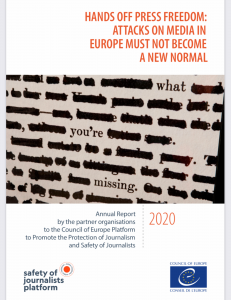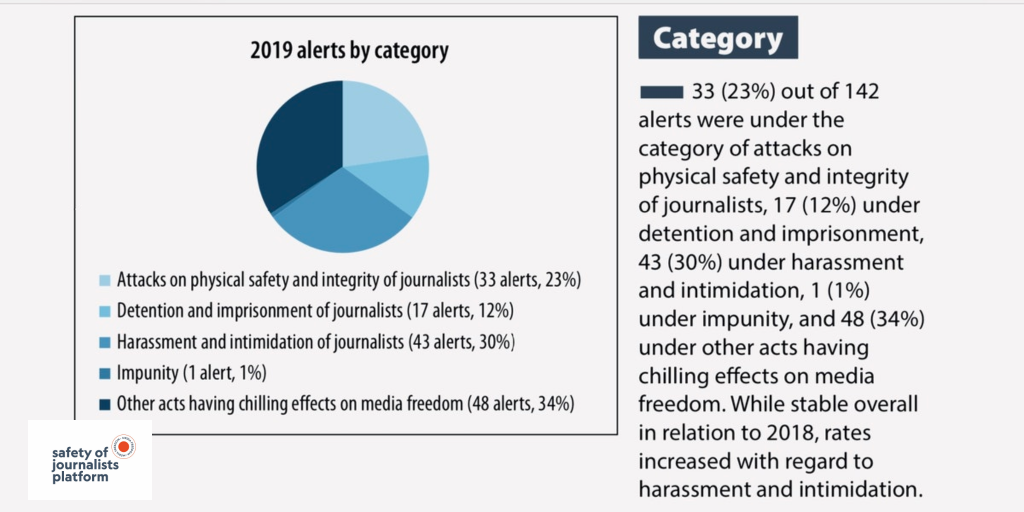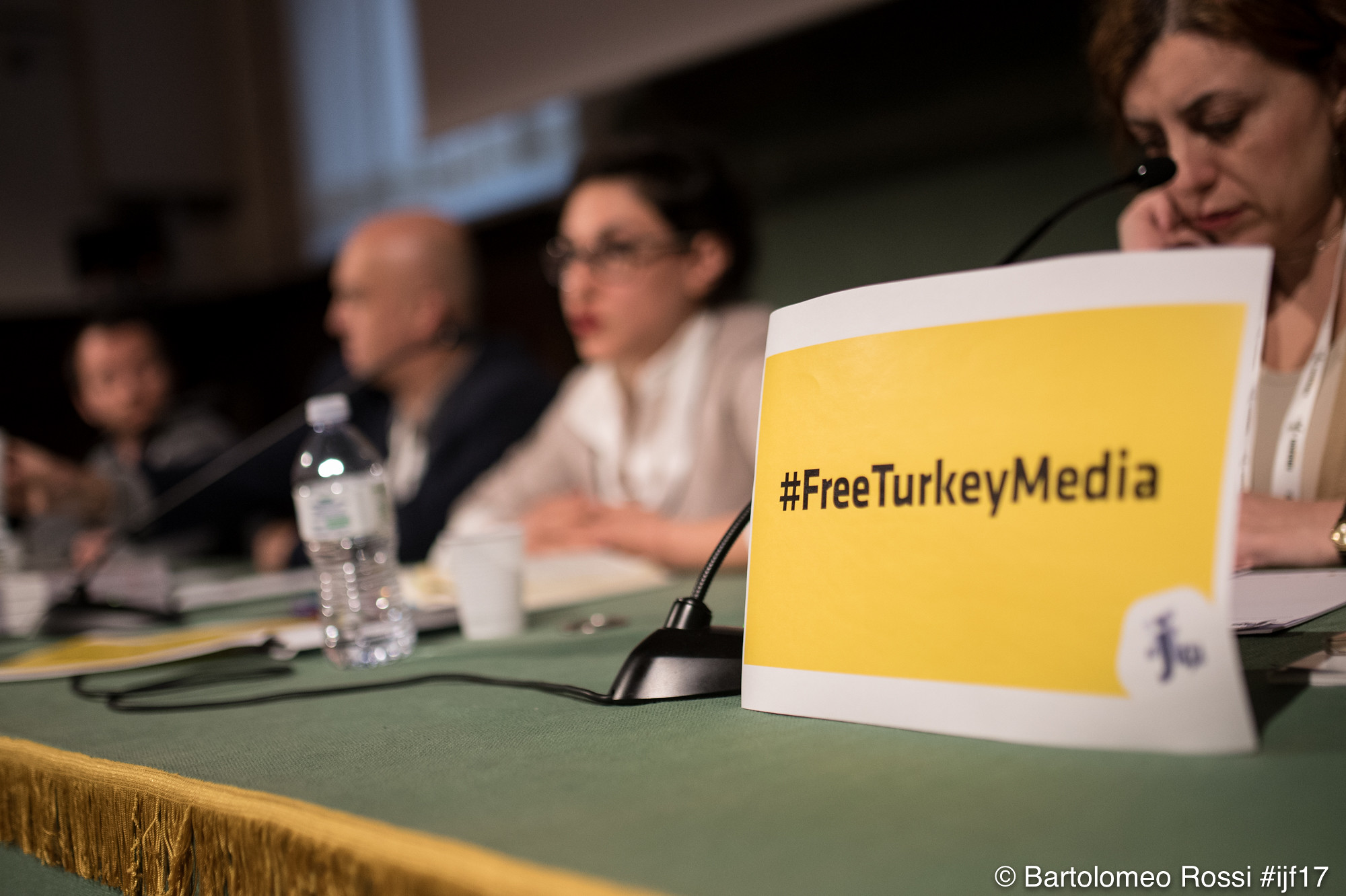29 Apr 20 | News and features
[vc_row][vc_column][vc_column_text]Attacks on press freedom in Europe are at serious risk of becoming a new normal, 14 international press freedom groups and journalists’ organisations including Index on Censorship warn today as they launch the 2020 annual report of the Council of Europe Platform to Promote the Protection of Journalism and the Safety of Journalists. The fresh assault on media freedom amid the Covid-19 pandemic has worsened an already gloomy outlook.
 The report analyses alerts submitted to the platform in 2019 and shows a growing pattern of intimidation to silence journalists in Europe. The past weeks have accelerated this trend, with the pandemic producing a new wave of serious threats and attacks on press freedom in several Council of Europe member states. In response to the health crisis, governments have detained journalists for critical reporting, vastly expanded surveillance and passed new laws to punish “fake news” even as they decide themselves what is allowable and what is false without the oversight of appropriate independent bodies.
The report analyses alerts submitted to the platform in 2019 and shows a growing pattern of intimidation to silence journalists in Europe. The past weeks have accelerated this trend, with the pandemic producing a new wave of serious threats and attacks on press freedom in several Council of Europe member states. In response to the health crisis, governments have detained journalists for critical reporting, vastly expanded surveillance and passed new laws to punish “fake news” even as they decide themselves what is allowable and what is false without the oversight of appropriate independent bodies.
These threats risk a tipping point in the fight to preserve a free media in Europe. They underscore the report’s urgent wake-up call on Council of Europe member states to act quickly and resolutely to end the assault against press freedom, so that journalists and other media actors can report without fear.
Although the overall response rate by member states to the platform rose slightly to 60 % in 2019, Russia, Turkey, and Azerbaijan – three of the biggest media freedom violators – continue to ignore alerts, together with Bosnia and Herzegovina.
2019 was already an intense and often dangerous battleground for press freedom and freedom of expression in Europe. The platform recorded 142 serious threats to media freedom, including 33 physical attacks against journalists, 17 new cases of detention and imprisonment and 43 cases of harassment and intimidation.

The physical attacks tragically included two killings of journalists: Lyra McKee in Northern Ireland and Vadym Komarov in Ukraine. Meanwhile, the platform officially declared the murders of Daphne Caruana Galizia (2017) in Malta and Martin O’Hagan (2001) in Northern Ireland as impunity cases, highlighting authorities’ failure to bring those responsible to justice. Only Slovakia showed concrete progress in the fight against impunity, indicting the alleged mastermind and four others accused of murdering journalist Ján Kuciak and his fiancée, Martina Kušnírová.
At the end of 2019, the platform recorded 105 cases of journalists behind bars in the Council of Europe region, including 91 in Turkey alone. The situation has not improved in 2020. Despite the acute health threat, Turkey excluded journalists from a mass release of inmates in April 2020, and second-biggest jailer Azerbaijan has made new arrests over critical coverage of the country’s coronavirus response.
2019 saw a clear increase in judicial or administrative harassment against journalists, including meritless SLAPP cases, and spurious and politically motivated legal threats. Prominent examples were the false drug charges filed against Russian investigative journalist Ivan Golunov and the continued imprisonment of journalists in Ukraine’s Russia-controlled Crimea. The Covid-19 crisis has strengthened officials’ tools to harass journalists, with dangerous new “fake news” laws in countries such as Hungary and Russia that threaten journalists with jail for contravening the official line.
Other serious issues identified by 2019 alerts included expanded surveillance measures threatening journalists’ ability to protect their sources, including in France, Poland and Switzerland, as well political attempts to “capture” media through ownership and market manipulation, most conspicuously of all in Hungary. These threats, too, are exacerbated by the actions taken by several governments under the health crisis, which further include arbitrary limitations on independent reporting and on journalists’ access to official information about the pandemic.
Jessica Ní Mhainín, Index’s policy research and advocacy officer, says, “There is a growing pattern of intimidation aimed at silencing journalists in Europe. The situation in Eastern Europe – especially in Hungary, Poland, and Bulgaria – is particularly concerning. But the killing of Lyra McKee shows that we cannot take the safety of journalists for granted anywhere – not even in countries that are seen to be safe for journalists. This report provides an opportunity for us all to come to grips with the serious situation that is facing European media and to remind ourselves of the vital role that the media play in holding power to account.”
Index and the other platform partners call for urgent scrutiny of action taken by governments to claim extraordinary powers related to freedom of expression and media freedom under emergency legislation that are not strictly necessary and proportionate in response to the pandemic. Uncontrolled and unlimited state of emergency laws are open to abuse and have already had a severe chilling effect on the ability of the media to report and scrutinise the actions of state authorities.
While the platform welcomes an increased focus on press freedom by European institutions, including both the Council of Europe and European Union institutions, the ongoing crisis demands more urgent and stringent responses to protect media freedom and freedom of expression and information, and to support the financial sustainability of independent professional journalism. In the age of emergency rule, protecting the press as the watchdog of democracy cannot wait.[/vc_column_text][/vc_column][/vc_row]
22 Apr 20 | Covid 19 and freedom of expression, News and features
[vc_row][vc_column][vc_single_image image=”113291″ img_size=”full”][vc_column_text]The Indian state’s response to the coronavirus outbreak has seen an acceleration of violence against Muslims, further silencing of political dissent and attacks on press freedom. These trends are being tracked on the Index on Censorship global map monitoring media freedom violations during the coronavirus pandemic, put together by our staff, our contributors and readers as well as our partners at the Justice for Journalists Foundation.
One pattern to emerge is Prime Minister Narenda Modi’s determination to control the coronavirus narrative. Before the lockdown was announced, Modi met with the press to urge them to only publish “inspiring, positive stories” about the government’s handling of coronavirus. Many outlets have buckled under the pressure, fearful of being branded unpatriotic. As reported on the Index map, part of this was a campaign by Modi’s government for advertisers and businesses to cut support for independent news outlets. This has presented an enormous danger to the free press in India. If only pro-government media are allowed to flourish during one of the biggest global crises in recent years, those with the power to protect, or neglect, people’s health and well-being will not be held to account for their actions.
Journalists whose reporting does not follow the party line on coronavirus face harassment and detention by the state. For example, independent news website the Wire reported that Yogi Adityanath, a fundamentalist Hindu cleric and chief minister of India’s largest state Uttar Pradesh, attended a religious ceremony after the lockdown had been announced. This did not chime well with the presiding narrative that the Muslim community are to blame for the spread of the virus. There have been reports that Siddharth Varadarajan, founder-editor of the Wire, is now facing criminal proceedings for, among other things, “creating or promoting enmity between classes”.
Thousands of people, including jurists and academics, have signed a public statement condemning the state’s actions, calling legal action against Varadarajan an attack on press freedom. While this support is undoubtedly appreciated by Varadarajan, Modi’s attitude towards the press since he came to power in 2014, and continuing in the wake of coronavirus, means things do not bode well for him.
But these are not the only attacks tracked on our map. Journalists have also faced physical violence in the street while trying to report on the outbreak. Naveen Kumar from news website Aaj Tak was beaten by police in Delhi on his way to his office on 23rd March. On the same day Ravi Reddy, bureau chief at The Hindu, was attacked by three policemen in Hyderabad. Mendu Srinivas, political bureau chief at Andhra Jyothy, was also beaten by police in Hyderabad. Since 2014, there have been over 200 serious attacks on journalists.
We have also had reports of journalists being accused of spreading “fake news”. As with many allegations of fake news that we have tracked on the map, more often than not the charge is being used to silence people. At the same time, misinformation is being allowed to spread like wildfire. In a sadly predictable turn of events, rumours have spread online that the Muslim community is responsible for the virus’ spread.
As a result, Muslims have been physically attacked in the street and Sikh temples have warned people against buying milk from Muslim dairy farmers, claiming it is infected with coronavirus. Mohammed Haider, who runs a milk stall, told The New York Times: “People only need a small reason to beat us or lynch us.” The Indian Express, a widely read daily national newspaper, reported that hospitals were segregating Muslim and Hindu coronavirus patients, quoting a doctor as saying it was a government decision.
The events of the past year have shone a light on the mistreatment of Muslims in India. The repealing of Article 370 and the subsequent internet shutdown in Jammu and Kashmir from August, and the Citizenship Law in December, both discriminated against Muslims. Now the coronavirus outbreak has provided another excuse to demonise and discriminate Muslims in the country.
And this might highlight the biggest trend of all, namely that the coronavirus outbreak has exacerbated issues already bubbling beneath the surface since Modi came to power in 2014. In this environment, a free press has never felt more important.
If you know of any examples of violations against the media in India or elsewhere, please do report them to our map. [/vc_column_text][/vc_column][/vc_row]
02 Apr 20 | News and features, Turkey
[vc_row][vc_column][vc_column_text]

International Journalism Festival/Flickr
[/vc_column_text][/vc_column][/vc_row][vc_row][vc_column][vc_column_text]“In the Middle Ages people watched convicts getting quartered in public squares. Nowadays, on social media, they watch reporters as they live-tweet their ordeals: detention, physical attacks on the streets, losing their livelihoods,” said Turkish author and journalist Kaya Genç.
“For most Turks, watching journalists getting sacked or imprisoned or destroying each other’s careers became entertainment.”
Genç spoke to Index to answer questions posed by the Index youth advisory board about life as a journalist in Turkey under President Recep Tayyip Erdogan, and his latest book, The Lion and the Nightingale: A Journey Through Modern Turkey.
The youth board are elected for six months, and meet once a month online over that period to discuss freedom of expression issues. They are based around the world.
Hana Meihan Davis, from Hong Kong, asked how Erdogan managed to strip Turkey of journalistic freedom. Genç explained that divisions have existed between political sects in the media for decades, which the current ruling party was then able to take advantage of.
“When Islamists were in trouble in the 1990s secularists supported court cases against them; when secularists were locked up some liberals applauded; when Kurds were imprisoned most journalists looked the other way. Now as most of their colleagues are sacked or locked up conservatives act as if all is normal,” said Genç, who is also a contributing editor to Index on Censorship magazine.
Amid this sense of apathy Erdogan moved to create “a small army of loyalists in the media” as other news sites and newspapers were closed down.
Davis followed up her question, asking if people realised what was happening at the time? This is a question often asked when we look back with hindsight at the gradual erosion of freedoms. Were people like a frog who doesn’t realise the temperature of his water is slowly being increased to boiling? Genç said some journalists saw the dangers.
“Reporters and editors declared their independence, or found new patrons, and they are producing excellent work away from the influence of state power. I’m sure they were aware of what was happening while they worked at titles now tamed and indirectly owned by the government.”
The landscape for journalists in Turkey today is rocky terrain. There is an acute awareness of the censorship laws that can be imposed, coupled with a determination to provide much needed accurate reporting.
From the UK, Saffiyah Khalique asked about the laws around “public sensitivities”, which can result in imprisonment for up to a year for disrespecting the beliefs of religious groups, insulting Turkishness and other such “offences”. Genç said they are used within society to silence political dissenters.
“Twitter trolls who present themselves as pro-government journalists use these unclear laws to put their enemies behind bars. If an artist, piano player or actor says something critical about the government, they go through their timeline, find something they find insulting, and ask the public prosecutor to step in.”
Despite this possibility of prosecution being ever around the corner, Genç said he does not feel unsafe or threatened as a journalist in Turkey. “I feel free”, he answered to a question from Emily Boyle, a dual citizen of the UK and Switzerland
Recognising the value of objectivity appears to be Genç’s lifeline. When Indian national Samarth Mishra asked what is the most difficult part of being a journalist in Turkey, Genç said: “The hardest thing for a writer reporting from Turkey is to remain objective. You can’t be bitter about the government. Readers can benefit from the cold heart of a writer who does her best to be objective in her reporting.”
He said: “Our job, as writers, is to hold people with power to account, not to promote this or that political leader, defend this or that political ideology, propagate for this or that country … When a writer inhibits a space where nobody can accuse her of partisanship, believe me the effect of her writing will be much greater.”
The Lion and the Nightingale, Genç’s latest book, was published recently. It takes the reader on a journey through modern Turkey while exploring its history, via interviews he conducted on the road. Egil Sturk, from Sweden, asked Genç if there were any questions he was hesitant to ask his interviewees.
Genç said: “I am hesitant to ask questions about people’s religious beliefs and fiery ideological commitments. I prefer to give them enough space to articulate themselves where the bizarre, the eerie appears like a diamond in a mine. When people feel safe they tell you the most amazing things. Like an analyst you need to just sit there and listen.”
In answer to a question from Aliyah Orr (UK) about the emotional impact of the interviews he was conducting, Genç said:
“The prison chronicle of my friend and colleague Murat Çelikkan … had the strongest emotional effect on me. We used to work together, behind adjacent desks, and his experience in prison was empowering and unsettling. His account of imprisonment was rich with detail and you could see a great writer disappearing into the story’s characters and particulars of his story.”
Faye Gear from Canada asked what is different about today’s landscape in terms of freedom of expression. To tackle the suppression of free speech, Genç said people must think for themselves.
“I grew up idolising individual thinkers and writers: Susan Sontag, Jacques Derrida, Chantal Mouffe, VS Naipaul,” said Genç. “Nowadays we are invited to subscribe to what seems to be the most forward-thinking tribe and then follow its leaders by liking and retweeting their political snippets.”
In the face of an atmosphere of censorship, Genç remains defiant. In answer to a question from Satyabhama Rajoria, from India, about the struggles he faces as a journalist and author, Genç said: “There is of course always the anxiety that comes with publishing your writing, but that is healthy. Bullies, from the left and the right, may take your sentences out of context but that, too, is something one can deal with.”[/vc_column_text][/vc_column][/vc_row][vc_row][vc_column][vc_single_image image=”112300″ img_size=”full”][/vc_column][/vc_row][vc_row][vc_column][vc_basic_grid post_type=”post” max_items=”3″ grid_id=”vc_gid:1585828417099-e398f95f-d0bf-6″ taxonomies=”7355″][/vc_column][/vc_row]
 The report analyses alerts submitted to the platform in 2019 and shows a growing pattern of intimidation to silence journalists in Europe. The past weeks have accelerated this trend, with the pandemic producing a new wave of serious threats and attacks on press freedom in several Council of Europe member states. In response to the health crisis, governments have detained journalists for critical reporting, vastly expanded surveillance and passed new laws to punish “fake news” even as they decide themselves what is allowable and what is false without the oversight of appropriate independent bodies.
The report analyses alerts submitted to the platform in 2019 and shows a growing pattern of intimidation to silence journalists in Europe. The past weeks have accelerated this trend, with the pandemic producing a new wave of serious threats and attacks on press freedom in several Council of Europe member states. In response to the health crisis, governments have detained journalists for critical reporting, vastly expanded surveillance and passed new laws to punish “fake news” even as they decide themselves what is allowable and what is false without the oversight of appropriate independent bodies.

